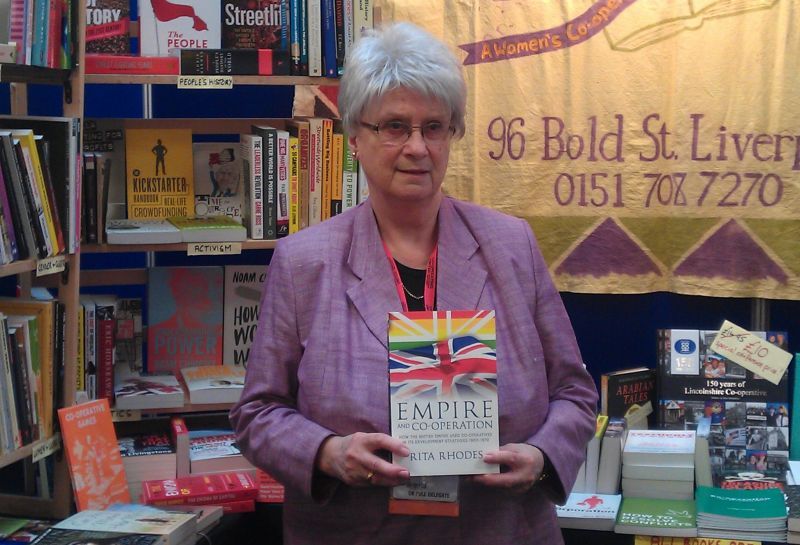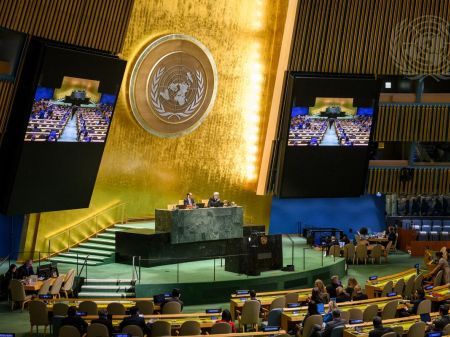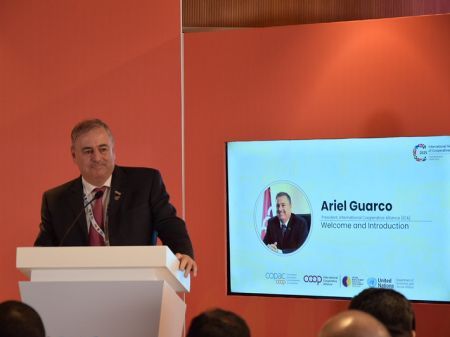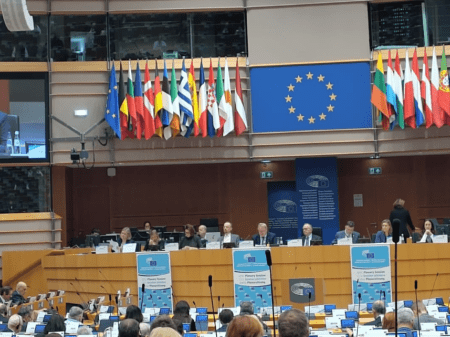
The ICA is embracing yet another milestone. In 2020, the organisation is celebrating its 125th anniversary and, as we are living history, we wanted to re-visit it. We can do so through the research and writings of Dr Rita Rhodes. We spoke to her about the ICA’s creation and lessons from its history. Dr Rita Rhodes has helped fill a gap in the cooperative movement’s understanding of its key organisations such as the International Cooperative Alliance and the influence of past cooperative leaders.
Her Ph.D thesis was on the International Cooperative Alliance. Born into a cooperative family, she grew up in the British cooperative movement, which had high regard for the ICA. She worked in British cooperative organisations and between 1982-1985 became the Education Officer and Women’s Officer of the ICA in London and Geneva, liaising with regional counterparts.
Later she wrote ‘The International Co-operative Alliance during War and Peace 1910-1950’, co-authored ‘The Thematic Guide to ICA Congresses 1895-1995, ‘An Arsenal for Labour’, ‘Empire and Co-operation’ and most recently published ‘Co-operative Adventures – we joined the Co-op and saw the world’.
You have dedicated an important part of your work to researching and documenting the cooperative movement in general and the ICA in particular. What made you choose the ICA as your research topic?
I grew up in the British cooperative movement, which had a very close relationship with the ICA when I was a child. The ICA and the British cooperative movement were very popular.
I then studied at the Co-operative College and, in 1980, I was in the ICA library in London when Anne Laming was the librarian. She had a strong background in the cooperative movement and while I was there she suggested the library contained sources for Doctoral theses. She mentioned several and the one that stayed in my mind was why and how the ICA survived the World Wars and the Cold War. I took this for my own thesis and began work on it a decade or so later. The ICA published a book version of it as part of its centenary celebrations in 1995.
With the COVID-19 pandemic affecting cooperatives all over the world, what lessons could we learn by looking at past crises? Have you come across examples of cooperation during crises?
Particularly difficult crises for the ICA were those, which occurred during the first and second World Wars and the Cold War. It survived when similar organisations with which it close relations and also espoused peace and the international brotherhood of man split under the pressures. My research suggested two overarching reasons for the Alliance’s survival. They were its ideology and its organisation, the former shaping the latter. It saw the First World War as one between capitalists, which cooperatives were not and so they remained at peace with each other. A number of cooperative leaders maintained contact, which facilitated the monthly production of the Bulletin of International Co-operation which was produced in London and sent to Dutch cooperative leaders who then transmitted it to their counterparts in Germany and France who translated, printed and distributed. This network also passed personal information between cooperative movements relating to prisoners of war and families unable to return to their home countries. Condolences were passed to the German cooperative leader when his son was killed in the battle of the Somme in July 1916. Throughout these vicissitudes, ICA leaders remained accountable. They organised an early version of the truth and reconciliation process at their first postwar congress in 1921. Member movements reported on their experiences during the war, how it affected them, what governments required from them and apologising when these required the breaking cooperative principles such as trading with non-members. During the second World War, the ICA was fortunate in that its head office was in Britain which was bombed but not occupied. British delegates to the ICA Central Committee became a temporary version of it and a British Vice President assumed the role of Acting President. Thus the work of its head office could be supervised and related to development across the Atlantic with the embryonic United Nations. All this was again reported to the ICA’s first post war congress and approved.
Horace Plunkett, Earl Grey and Henry Wolff were all active in the young International Cooperative Alliance. What was the relationship between them?
They were figures in their own right but also collaborated in the ICA. Preliminary meetings to form the Alliance took place during a major and bitter debate between cooperators. This was about relations between consumer and producer cooperatives. Some argued that the alliance should be one for the ‘friends of cooperative production’. And Grey was a strong supporter of this idea. Wolff and Plunkett believed it should be open to all kinds of cooperative. That view won. Grey, Wolff and Plunkett came from wealthy families and could pursue their own special cooperative interests. Grey served as Administrator of Rhodesia (Zimbabwe ad Zambia) and later as Governor General of Canada. In both locations he encouraged cooperative development. Wolff studied in Germany and became familiar with its cooperatives and met a number of cooperative leaders from other countries as well. He advanced theories of cooperative thrift and credit and was influential in their development in India and Ireland. Plunkett organised bodies that could assist cooperative development particularly in Ireland and Britain. He also wrote and Grey invited him to lecture on one of his works to Canadian farmers. Plunkett had suffered Tuberculosis and was advised to spend part of his time in a warm dry climate. He took to ranching in Wyoming for some months each year and Grey had hoped he could lecture Canadian farmers during one of these visits. Grey, Wolff and Plunkett pursued their own cooperative specialisations but their paths crossed in the International Cooperative Alliance.
Can you tell us more about your most recent book – Co-operative Adventures? What inspired it?
The book is a joint autobiography of my husband Bernard Rhodes and myself. It covers some five decades and describes our experiences in British cooperatives and other countries. Whereas my earlier writings were based on research ‘Co-operative Adventures’ is anecdotal. A joint autobiography is perhaps unusual but we shared cooperative enthusiasms and experiences. During one period we virtually had a commuting marriage that would not have been possible without shared beliefs and interests.
What are you working on right now? Could you share any news about your upcoming projects?
I am in my vintage years so I do not expect to write any more books.
What are your expectations about the 33 World Cooperative Congress?
I look forward to it because I believe there is an urgent need to strengthen cooperative identity. It is less strong today than it has been in the past. Clarity is needed to facilitate emergence of cooperative solutions to modern crises such as the pandemic and threatened climate. Cooperation is a distinct form of economy and collective ownership that seeks to benefit society rather than private shareholders.
--
The ICA team wishes to thank Dr Rita Rhodes for her contribution to the understanding of our organisation and for her dedication to the ICA as research subject. Leire Luengo, ICA Director of Communications




